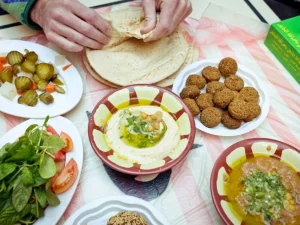JORDANIAN CUISINE
There is a quote in Jordan which goes something like this:
‘Even when you are full, you can still eat 40 more bites of food’.’
Jordanian cuisine is a rich and enticing blend of Circassian, Palestinian, North African, Persian and Mediterranean with Turkish influences. Many dishes you will come across are those typical of Arabic cuisine and which you may have come across before: falafel, hummus, kebabs, stuffed grape leaves and a wide variety of salads. Jordan cuisine is very much farm to table and there is a rich history of vegetarian and vegan dishes. For those who are vegetarian or vegan, you will most certainly be able to find a good selection of food. If you have allergies, we recommend you stay away from street food.
Sahtein! Enjoy your food!
 Breakfast
Breakfast  consists of a moreish sesame topped roll filled with roasted eggs, cheese, salad and the eponymous and phenomenal spice zata’ar (a mixture of thyme, roasted sesame and sumac).
consists of a moreish sesame topped roll filled with roasted eggs, cheese, salad and the eponymous and phenomenal spice zata’ar (a mixture of thyme, roasted sesame and sumac). to vegetarian and vegan are available although usually without tomato sauce. This is a popular breakfast food yet can be enjoyed any time of the day. We recommend waiting for the fresh ones rather than purchasing the premade ones.
to vegetarian and vegan are available although usually without tomato sauce. This is a popular breakfast food yet can be enjoyed any time of the day. We recommend waiting for the fresh ones rather than purchasing the premade ones. reserved for special occasions: weddings, promotions, a new baby and funerals, to name just a few. This traditionally consists of lamb (and sometimes chicken) slow cooked in a fermented yoghurt sauce made of jameed. Jameed comes from dried goat or sheep milk and the taste is phenomenal. It’s salty, rich and has that umami punch. The meat is served with plenty of rice on top of a bed of thin bread called shrak topped with pine nuts and almond slivers, and most importantly, a bowl of that divine yoghurt sauce.
reserved for special occasions: weddings, promotions, a new baby and funerals, to name just a few. This traditionally consists of lamb (and sometimes chicken) slow cooked in a fermented yoghurt sauce made of jameed. Jameed comes from dried goat or sheep milk and the taste is phenomenal. It’s salty, rich and has that umami punch. The meat is served with plenty of rice on top of a bed of thin bread called shrak topped with pine nuts and almond slivers, and most importantly, a bowl of that divine yoghurt sauce. cauliflower, potato, carrot and either meat or chicken with the fluffy, fragrant rice forming part of this dish. The name ‘Maqloubeh’ roughly translates as upside down and this is the unique/fascinating part. The chef will dramatically invert the pot on a serving dish and then the dish is turned back over.
cauliflower, potato, carrot and either meat or chicken with the fluffy, fragrant rice forming part of this dish. The name ‘Maqloubeh’ roughly translates as upside down and this is the unique/fascinating part. The chef will dramatically invert the pot on a serving dish and then the dish is turned back over. shredded pastry named kataifi, gorgeously stringy cheese from Nablus in Palestine and sweet sugar syrup. This famous and unique dish dates back at least five centuries, with some reports dating it back much further. Don’t miss it!
shredded pastry named kataifi, gorgeously stringy cheese from Nablus in Palestine and sweet sugar syrup. This famous and unique dish dates back at least five centuries, with some reports dating it back much further. Don’t miss it! Baklawa: Layers of filo dough are filled with chopped nuts, usually pistachio or walnut, and then sweetened with syrup. There is a huge variety of shapes and varieties to choose from. This dessert goes back centuries although its origin is contested. You can purchase it by piece or take a box (or three) home with you. They make great gifts!
Baklawa: Layers of filo dough are filled with chopped nuts, usually pistachio or walnut, and then sweetened with syrup. There is a huge variety of shapes and varieties to choose from. This dessert goes back centuries although its origin is contested. You can purchase it by piece or take a box (or three) home with you. They make great gifts! celebrate the olive harvest, Musakhan features chicken roasted to perfection on a bed of taboon flatbread that is baked in a clay oven and heavenly fragrant caramelised onions spiced with sumac, allspice and saffron. A modern version has been created where thin shrak bread (the one used in shawerma) is stuffed with chicken and caramelised onions. A must try!
celebrate the olive harvest, Musakhan features chicken roasted to perfection on a bed of taboon flatbread that is baked in a clay oven and heavenly fragrant caramelised onions spiced with sumac, allspice and saffron. A modern version has been created where thin shrak bread (the one used in shawerma) is stuffed with chicken and caramelised onions. A must try! Shawerma:
Shawerma:  Mujadara:
Mujadara:  are slathered in spices and then placed in a pit dug under the sand. The pit is then filled with wood and slow cooked. The end result is phenomenal.
are slathered in spices and then placed in a pit dug under the sand. The pit is then filled with wood and slow cooked. The end result is phenomenal. here after the influx of Syrian refugees fleeing the Civil War. What makes this ice cream unique is the mastic which lends it a chewy and stretchy texture. It is not made by churning but by being pounded in metal drums which makes a delightful tune!
here after the influx of Syrian refugees fleeing the Civil War. What makes this ice cream unique is the mastic which lends it a chewy and stretchy texture. It is not made by churning but by being pounded in metal drums which makes a delightful tune! seeds and thyme. Za’atar is extremely versatile and we recommend taking some home with you. Other herbs popular in Jordan include sage, which is brewed with tea and which you will definitely get to try while here. We also love rosemary and lavender too, along with many others.
seeds and thyme. Za’atar is extremely versatile and we recommend taking some home with you. Other herbs popular in Jordan include sage, which is brewed with tea and which you will definitely get to try while here. We also love rosemary and lavender too, along with many others. world; averaging a yield of 23-24,000 tonnes of olive oil every year. This number is weather dependant though, as higher temperatures can lead to lower harvests. Jordan is home to around 10.5 million olive trees covering 56,000 hectares (138,400 acres) of olive groves that take up around three-quarters of the kingdom’s agricultural land. Most of Jordan’s olive groves are located in the north of the country and provide livelihoods to more than 80,000 Jordanian households. Jordan produces premium olive oil. It’s unique in regards to the fact it has some of the oldest olive trees in the world; the oldest being some 3,000 years old. Every November and Olive Festival is held in Amman, a four-day event that showcases the over 20 varieties of olives grown in the kingdom.
world; averaging a yield of 23-24,000 tonnes of olive oil every year. This number is weather dependant though, as higher temperatures can lead to lower harvests. Jordan is home to around 10.5 million olive trees covering 56,000 hectares (138,400 acres) of olive groves that take up around three-quarters of the kingdom’s agricultural land. Most of Jordan’s olive groves are located in the north of the country and provide livelihoods to more than 80,000 Jordanian households. Jordan produces premium olive oil. It’s unique in regards to the fact it has some of the oldest olive trees in the world; the oldest being some 3,000 years old. Every November and Olive Festival is held in Amman, a four-day event that showcases the over 20 varieties of olives grown in the kingdom. coming a close second. Bread is consumed with every meal and there are many different kinds. Some of the most popular include taboon bread which is baked in a clay oven and round pita-style bread. Bread is sold by the kilo here, and prices are fixed by the government.
coming a close second. Bread is consumed with every meal and there are many different kinds. Some of the most popular include taboon bread which is baked in a clay oven and round pita-style bread. Bread is sold by the kilo here, and prices are fixed by the government. abundance of vegetables and fruits-including tropical ones such as dates bananas, passionfruit and guavas. Almost all of the produce is grown within the kingdom and people enjoy most of the produce seasonally. This means that everything is fresh and costs are competitive. Jordan has a large date industry, with its exports going all over the world. Jordan is famed for the Medjool date which is arguably one of the best in the world. Definitely don’t forget to take some of these home with you!
abundance of vegetables and fruits-including tropical ones such as dates bananas, passionfruit and guavas. Almost all of the produce is grown within the kingdom and people enjoy most of the produce seasonally. This means that everything is fresh and costs are competitive. Jordan has a large date industry, with its exports going all over the world. Jordan is famed for the Medjool date which is arguably one of the best in the world. Definitely don’t forget to take some of these home with you!




